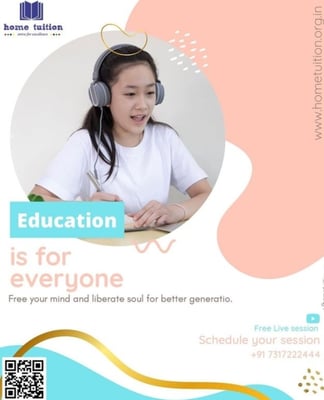Home Tuitions classes for Kids - 59 options found
Home tuition for children aged 2 to 12 offers personalized l... Home tuition for children aged 2 to 12 offers personalized learning, accelerates cognitive development, and builds confidence. It allows for tailored teaching and flexibility in learning pace. Read more
Advantages and Considerations of Home Tuition for Children Aged 2 to 12
Introduction
Home tuition offers a personalized educational experience for children between the ages of 2 and 12, providing tailored learning that addresses individual needs, preferences, and pace. This comprehensive examination discusses the benefits and potential limitations of home tuition, along with answers to common questions from parents.
Advantages of Home Tuition
Enhanced Learning Environment
Personalized Attention
Home tuition allows for one-on-one attention from the tutor to the student, which is rarely available in traditional classroom settings. This personalized interaction ensures that lessons are tailored to the student's specific learning abilities and needs, potentially leading to better comprehension and performance.
Customized Learning Strategies
Tutors can adapt their teaching methods to fit the learning style of the child, whether they are visual, auditory, or kinesthetic learners. This customization can facilitate a deeper understanding and a more enjoyable learning experience, which is crucial in early childhood education.
Cognitive and Brain Development
Accelerated Learning
With the focused attention and direct feedback provided in home tuition, children can progress at their own pace, often moving faster than they would in a conventional classroom setting. This can be especially beneficial during the formative years of brain development.
Enhanced Cognitive Skills
Home tuition can enhance problem-solving skills, critical thinking, and the ability to apply knowledge in various situations. These cognitive skills are developed through tailored exercises and the close interaction with a tutor who challenges the child's thinking processes.
Personality Development
Confidence Building
One-on-one tutoring helps to build self-esteem and confidence by providing a safe learning environment where children can ask questions and make mistakes without fear of public embarrassment. This positive reinforcement boosts their willingness to engage and learn.
Resilience and Independence
Personalized tuition requires the child to take an active role in their learning, which fosters independence and resilience. These skills are crucial for personal development and future academic and professional success.
Enhanced Career Opportunities
Foundation for Future Academic Success
Early mastery of fundamental concepts can set the groundwork for advanced education and open doors to gifted and talented programs or other advanced placements.
Skill Specialization
Home tuition can cater to special talents or interests of the child, providing an advanced start in areas like languages, science, music, or sports. This can be pivotal in determining the trajectory of a child’s future educational and career opportunities.
Limitations of Home Tuition
Cost
One significant drawback of home tuition is the expense. Hiring a personal tutor can be costly, and not all families can afford this for their children.
Social Development
Home-tutored children might miss out on the social interactions that come with a traditional school setting, which are essential for developing social skills and learning to work within diverse groups.
Dependence on Tutor Quality
The effectiveness of home tuition heavily relies on the quality and expertise of the tutor. A poorly matched tutor can hinder rather than help a child’s educational progress.
Answers to Common Questions
Q1: What age is appropriate for starting home tuition?
A: Home tuition can be beneficial at any age but starting from ages 2 to 5 can be particularly advantageous as it coincides with a critical period of cognitive development.
Q2: How does home tuition compare with online tutoring?
A: While online tutoring offers greater flexibility and access to a wide range of expertise, home tuition provides a more personal touch that can be important for young children’s learning and development.
Q3: Can home tuition replace school?
A: Home tuition is best used as a supplement to school education, especially for addressing specific learning needs that schools may not meet. However, for some families, home schooling could be a preferred comprehensive alternative.
Q4: What are the qualifications to look for in a home tutor?
A: Ideal qualifications include a strong educational background in the relevant subject areas, experience in teaching or tutoring children, and a personality that matches well with the child’s.
Conclusion
Home tuition offers numerous benefits for children aged 2 to 12, including personalized learning experiences, enhanced cognitive and personality development, and better preparation for future academic and career opportunities. However, it comes with limitations such as cost and potential impacts on social skills. Careful consideration is needed to decide if home tuition is the right choice for a child, alongside an effective pairing with a qualified tutor to maximize its benefits.
























